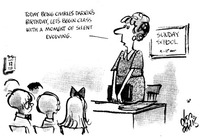
Philosophical notes…
On Borges in Cyberspace
“The Web is both the Library of Babel and The Book of Sand. It may not take the form of a book, or a library, but in many respects it resembles the infinite library of Borges’ imagination, and it changes constantly, just like the ever-changing pages of the Book of Sand. It is restless and dynamic and never the same twice.”
"Reading Borges in Cyberspace" - http://www.howtothinkaboutthefuture.com/?p=43
On Astrolabes
How to tell time 600 years ago? Brief summary of the Astrolabe: http://www.ted.com/talks/tom_wujec_demos_the_13th_century_astrolabe.html
The Return of the Scroll
This Tuesday I’ll be presenting a paper at a conference at St. Stephen’s House, Oxford. In this paper I’ll be talking about "The Return of the Scroll: From Codex to Google." Here’s an abstract:
One approach to the question of theological education online can begin with Google’s mission statement: “to organize the world’s information and make it universally accessible and useful.” This is not simply the ambition to amass a vast information stockpile in the spirit of the library of Alexandria any more than it is the continuation of the Enlightenment “dare to know.” Rather, insofar as “the world’s information” is presented as an organizational problem, Google’s universality is located in its ability to provide useful access. Google begins in a skeptical critique of information, and locates the solution in the search engine. What I will explore in this paper is the relation of Google’s understanding of universal access to the return of the scroll in the far right bar of our computer screens. Implicit to this account is the recognition, noted by Roger Chartier in his Forms and Meanings, that the only real parallel to today’s digital “revolution in the media and forms that transmit the written word… [is] the substitution of the codex for the volumen - of the book composed of quires for the book in the form of a roll” (p. 18). In other words, one way to understand the return of the scroll today is to look back to the rise of the codex roughly 1700 years ago. Here’s where a theological interest arises because Christians chose the codex over the scroll in a countercultural way a few hundred years earlier than the Greco-Roman culture it grew within. Although scholars have struggled to explain just why early Christianity so staunchly chose to go against the bibliographic grain in this regard, one reason rises to the fore: the universal nature of the Christian message itself. What we find is that Christianity is intimately tied to the process of binding codices, and, in this sense, the printing press only further radicalized this impulse. It’s in this light that we can gain an intriguing theological insight into information technology in the West, and the way it’s changing in today’s digital medium. Although useful universal access is at our fingertips, it arrives in an unbound way.
Derrida on Derrida
Randomly searching YouTube as you do and found this interesting little clip of Derrida commenting on the nature of his work and its relation to Heidegger’s.
God Talk
Stanley Fish offers a helpful summary of one of Terry Eagleton's latest on his NY Times Blog this week. Eagleton is a philosopher and critical theorist formerly based at the University of Manchester who has maintained a pointed and critical stance towards the rise in "school-yard" atheist figures such as Hitchins and Dawkins or as he refers to them, Ditchkins. Fish's opening paragraph gives the gist of what's going on in Eagleton's work:
Why are the most unlikely people, including myself, suddenly talking about God?” His answer, elaborated in prose that is alternately witty, scabrous and angry, is that the other candidates for guidance — science, reason, liberalism, capitalism — just don’t deliver what is ultimately needed. “What other symbolic form,” he queries, “has managed to forge such direct links between the most universal and absolute of truths and the everyday practices of countless millions of men and women?”
I'll be teaching a course this Autumn on this kind of return of religion in academic discourse and the reasons why so many theorists are drawn to its themes and discourse as they grapple with today's social and political questions.
Did Darwin Kill God?

